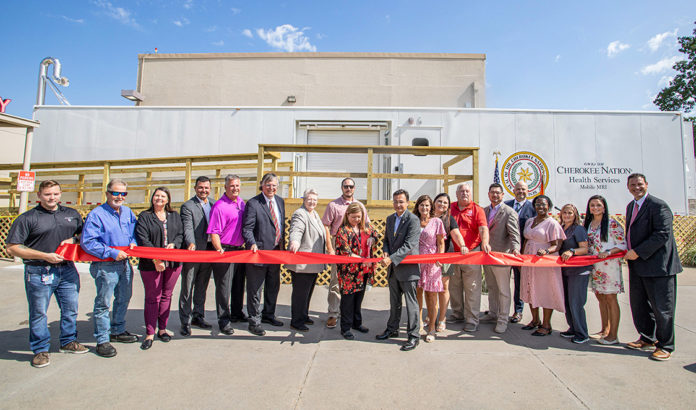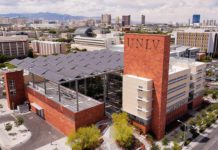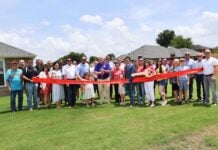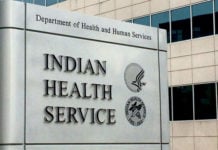
TAHLEQUAH, OK – Cherokee Nation leaders held a ribbon cutting to celebrate the tribe’s $2 million investment in a new mobile MRI unit at W.W. Hastings Hospital in Tahlequah, OK.
“Cherokee Nation continues our investment in health care with this state-of-the-art, patient-centered imaging technology that represents the next generation of clinical care,” said Cherokee Nation Principal Chief Chuck Hoskin Jr. “I’m extremely proud of our efforts to ensure the story of the Cherokee people continues by improving the health and quality of life for our citizens. Our record investment in our best-in-Indian Country health care system is positively changing the lives of Cherokee families for generations to come.”
The purchase of a new mobile MRI unit for Cherokee Nation W.W. Hastings Hospital is part of an overall investment in diagnostic imaging totaling more than $6 million across the tribe’s health services system. Prior to receiving the mobile MRI unit, Hastings patients received MRI services off-site.
“Providing hospital and emergency MRIs has been challenging for patients and staff,” said Dr. R. Stephen Jones, Cherokee Nation Health Services Executive Director. “This unit will decrease the length of time from order placement to exam completion, providing results more efficiently, and will increase capacity of daily in-patient and emergent MRI scans performed. Having the unit on-site at the hospital eliminates the need for Hastings EMS to transport patients to other sites for MRI studies. This will allow increased access for other patient transfers, thus increasing patient care and satisfaction.”
The new MRI system is also quieter, operates faster, and is more comfortable for the patient compared to traditional MRI technology often used in on-site health facilities. The artificial intelligence software engine, which the system operates, allows for such advancements, according to Jones.
“Patients will be given the choice to scan either head-first or feet-first for each scan to help mitigate any problems with claustrophobia,” said Jones. “The quieter operation and wide bore of this system will help ease the apprehension often felt by many of our patients.”
The mobile MRI unit will also enhance other Cherokee Nation Health Services initiatives, including the hospital’s Acute Stroke Ready Certification and stroke care provided through a partnership with Regional Brain Institute (RBI).
“This unit will allow for better practices that help meet the requirements of our Acute Stroke Ready Certification and allow us to proceed with additional stroke center certifications, making us the only hospital in the region with a nationally certified stroke program,” said Dr. Roger Montgomery, Cherokee Nation Health Services Executive Medical Director. “Having an MRI on-site also allows faster follow-up exams for the patients being cared for by our team of specialists from RBI.”
In 2021, Chief Hoskin and Deputy Chief Bryan Warner proposed and received support from the Council of the Cherokee Nation to invest $400 million for construction of a new hospital in Tahlequah to replace the nearly 40-year-old W.W. Hastings Hospital with the latest in hospital technology. When the new hospital is built and equipped with MRI technology, the new mobile MRI unit can be repurposed and used to provide services for even more patients through other Cherokee Nation Health Services facilities.
















































